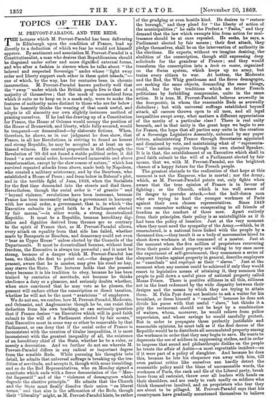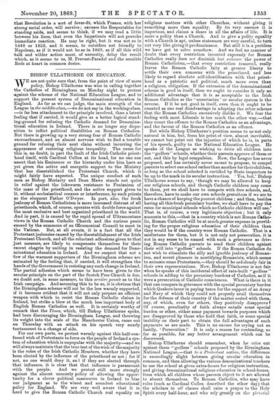TOPICS OF THE DAY.
M. PREVOST-PARADOL AND THE REDS.
rrtlectures which M. Prevost-Paradol has been delivering Edinburgh upon the condition of France, lead up directly to a deduction of which we fear he would not himself
approve. By sentiment and association M. Prevost-Paradol is a Constitutionalist, a man who desires that Republicanism should be disguised under softer and more dignified external forms, and who after a fashion is sincere when he talks about "the beloved and respected Sovereign" under whose "light sway
order and liberty support each other in these quiet islands,"—
one of which, by the way, has for centuries been in chronic insurrection. M. Prevost-Paradol knows perfectly well that the " sway " under which the British people live is that of a majority of themselves ; that the mask of monarchical form which it suits us to keep on is a mask only, worn to make the
features of authority more distinct to those who are far below ; but he honestly thinks the wearing of that mask useful, and adopts in all sincerity our own slightly insincere method of praising ourselves. If he had the drawing up of a Constitution for France, the House of Orleans would occupy the position of the House of Brunswick, and liberty, while fully secured, would be tempered—or demoralized—by elaborate fictions. When, therefore, he shows, as in our judgment he does show, that France, in all her Revolutions, is striving to found an honest and strong Republic, he may be accepted as at least an un-
biassed witness. His central proposition is that although the Revolution of '89 did not found a stable political order, it did
found "a new social order, henceforward immovable and above transformation, except by the slow course of nature," which has survived repeated attacks from above, made both by Napoleon, who created a military aristocracy, and by the Bourbons, who established a House of Peers ; and from below in Babceuf's plot, and in the terrible fight of June, 1848, when the Socialists for the first time descended into the streets and died there. Nevertheless, though the social order is "of granite" and "beyond violence," revolutions have been incessant, because France has been incessantly seeking a government in harmony with her social order, a government, that is, in which "the Executive submits in good faith to a Parliament elected by fair means,"—in other words, a strong decentralized Republic. It must be a Republic, because hereditary dig- nities and dignities derived from thrones are so contrary to the spirit of France that, as M. Prevost-Paradol allows, every attack on equality from that side has failed, whether made by Bonaparte or Bourbon, and democracy could not even "bear an Upper House" unless elected by the Councils of the Departments. It must be decentralized because, without local freedom, the Executive is always too powerful ; and it must be strong, because of a danger which M. Prevost-Para.dol has been, we think, the first to point out,—the danger that the peasant, aware that he is master, may give his steed no hay, may starve the State. The lecturer holds that the peasant obeys because it is his tradition to obey, because he has been trained by centuries of servitude, not because he thinks obedience a duty or a pleasure, and seriously doubts whether, when once convinced that he may vote as he pleases, the peasant will endure either the conscription or direct taxation, whether he will not be the most " avaricious " of employers.
We do not see, we confess, how M. Prevost-Paradol, Moderate, and Orleanist, and Anglomaniac though he be, can resist this deduction from his own teaching, or can seriously question that if France desires "an Executive which will in good faith submit to the will of a Parliament elected by fair means," that Executive must in some way or other be removable by that Parliament, or can deny that if the social order of France is inconsistent with the creation of titular inequalities, it is most inconsistent with the greatest inequality of all, the existence of an hereditary chief of the State, whether he be a ruler, or merely a decoration. And we further do not see wherein M. Prevost-Paradol differs in any radical or important degree from the sensible Reds. While pursuing his thoughts into detail, he admits that universal suffrage is breaking up the tra- dition of servitude, and accepts it, though with some trembling, and so do the Red Representatives, who on Monday signed a manifesto which ends with a fierce denunciation of the " Man- dat Imperatif " and of the " violenees of demagogues which degrade the elective principle." He admits that the Church and the State must finally' dissolve their union "on liberal terms," and that also is the affirmation of the Reds, though their "liberality" might, as M. Prevost-Paradol hints, be rather,
of the grudging or even hostile kind. He desires to "restore' the borough," and they plead for "the liberty of action of
the municipalities ;" he calls the Prefect a "Pasha," and they demand that the law which exempts him from action for mal- feasance should be at once repealed. He seeks, he says, a. Parliament elected by fair means ; their first attack, they pledge themselves, shall be on the intervention of authority in the elections. He expects, without we imagine desiring, the. abolition of the conscription, though still expressing deep solicitude for the grandeur of France ; and they would transform the conscription into a leve'e en masse, organized on the Swiss system, which keeps up no army, but
trains every citizen to war. At bottom, the Moderate and the Red, the Whig gentleman and the fierce demagogue, are seeking the same objects, demanding the same things,. could, but for the traditions which so fetter French. politicians by forbidding compromise, unite in the same action. It is true, M. Prevost-Paradol believes avowedly in the bourgeoisie, in whom the reasonable Reds as avowedly disbelieve ; but with universal suffrage established beyond attack, all careers thrown open to all men, and all legal inequalities swept away, what matters a different appreciation of the merits of a particular class I There is real unity beneath, and in that unity is the great hope we begin to see for France, the hope that all parties may unite in the creation of a Sovereign Legislative Assembly, unbound by any paper fetters, administering France through Secretaries appointed and dismissed by vote, and maintaining what of " representa- tion " the nation requires through its own elected Speaker.. It is in that, the establishment of an Executive which shall in good faith submit to the will of a Parliament elected by fair means, that we, with M. Prevost-Paradol, see the brightest. chance of a happy future for the French people.
The greatest obstacle to the realization of that hope at this moment is not the Emperor, who is mortal ; nor the Army, which, as M. Prevost-Paradol points out, only fights when aware that the true opinion of France is in favour of fighting ; or the Church, which is too well aware of its danger to provoke attack,—but the half-dozen men who are trying to hurl the younger workmen of Paris against their own chosen representatives. Since 1849' we can remember nothing so exasperating to all friends of freedom as the conduct of these men. Apart entirely from their principles, their policy is as unintelligible as if it had been the policy of lunatics. Just at the very moment. when they most need the sympathy of the Army,—which, be it remembered, is a national force linked with the people by a. thousand ties,—they insult it as a body of mercenaries hired to shoot down workmen at the command of a master. Just at. the moment when the five million of proprietors recovering from their panic about property are willing to try once more the experiment of self-government, they commence a series of eloquent tirades against property in general, describe employers as " cannibals " and employls as their "slaves." Just at the moment when any success could be achieved if only they would resort to legislative means of attaining it, they summon the people to pull down a useful piece of national property called. Maras Prison. There is positive silliness in all this, silliness not in the least redeemed by the wide disparity between their designs and the means by which they are trying to attain them. M. Felix Pyat does not hesitate to ask a waiter for his breakfast, or deem himself a " cannibal " because he does not divide his purse with that useful "slave," but thinks it a. pity the restaurant should not be kept by a combination of waiters, whom, moreover, he would relieve from police supervision, and whose savings he would carefully protect. But in order to propagate those perfectly justifiable and reasonable opinions, he must talk as if the first decree of the Republic would be to distribute all accumulated property among the workmen in order that they may begin to save. He wants to deprecate the use of soldiers in suppressing strikes, and in order to impress that sound and philanthropic dislike on the people he treats the affair of Aubin—a most regrettable incident—as if it were part of a policy of slaughter. And because he does this, because he lets his eloquence ran away with him, till even patient critics like ourselves can hardly detect the reasonable policy amid the blaze of unreasonable words, the workmen of Paris, the rank and file of the Liberal party, break loose from all restraint, throw over all leaders with heads on their shoulders, and are ready to rush madly on soldiers who think themselves insulted, and on proprietors who fear they are about to be pillaged. M. Prevost-Paradol says that his countrymen have gradually accustomed themselves to believe that Revolution is a sort of fever-fit, which France, with her strong social order, will survive ; excuses the Respectables for standing aside, and seems to think, if we may read a little 'between his lines, that even the Impatients will not provoke immediate reaction. He may be right, but it was not so in 1848 or 1852, and it seems, to outsiders not friendly to Napoleon, as if it would not be so in 1869, as if all this wild talk and wilder action must, of necessity, delay the result -which, as it seems to us, M. Prevost-Paradol and the sensible Reds at heart in common desire.



































 Previous page
Previous page